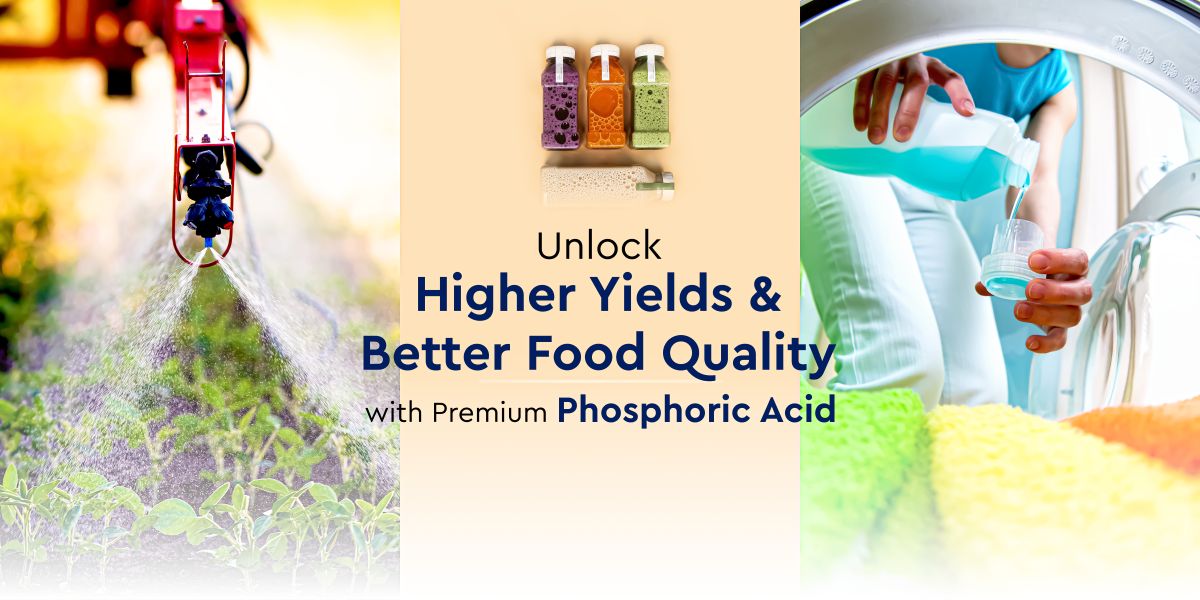Unlock Higher Yields & Better Food Quality with Premium Phosphoric Acid


Phosphoric Acid in the Fertilizer Industry
1. Essential Nutrient for Plant Growth
Phosphorus, derived from phosphoric acid, is one of the three primary nutrients (N-P-K) that plants require for growth. It plays a fundamental role in root development, energy transfer, and photosynthesis, ensuring higher crop yields and soil fertility.
2. Fertilizer Production & Types
Phosphoric acid is a key raw material in the production of phosphate-based fertilizers, including:
Monoammonium phosphate (MAP) – Provides high phosphorus content, ideal for early plant growth.
Diammonium phosphate (DAP) – Balances nitrogen and phosphorus for strong crop development.
Triple superphosphate (TSP) – Highly concentrated phosphate fertilizer for maximum efficiency.
3. Soil pH and Nutrient Absorption
Phosphoric acid adjusts soil pH, enhancing the availability of essential nutrients and improving soil health. This is crucial for acidic and alkaline soils where phosphorus may be less accessible.
4. Increased Crop Yield & Agricultural Productivity
With global food demand rising, phosphoric acid-based fertilizers play a critical role in ensuring high agricultural output and food security.
Phosphoric Acid in the Food Industry
1. Food Additive for Acidity Regulation
Phosphoric acid is a common food additive used to regulate acidity, enhance flavors, and maintain the texture of processed foods.
2. Key Applications in the Food & Beverage Sector
Soft drinks & fruit juices – Provides the tangy taste in carbonated drinks.
Meat & poultry processing – Improves texture, enhances flavor, and retains moisture.
Dairy industry – Used in cheese production to stabilize pH and improve texture.
Baking industry – Acts as a leavening agent in baked goods.
3. Food Safety & Shelf Life
High-quality phosphoric acid ensures food safety, prevents microbial growth, and extends shelf life, reducing food waste and spoilage.
Why Quality Matters: The Impact of Low-Grade Phosphoric Acid
1. Consequences in Fertilizer Production
Reduced crop yields – Impurities in low-quality phosphoric acid hinder nutrient absorption.
Environmental contamination – Poor-grade phosphoric acid can lead to soil and water pollution.
Regulatory non-compliance – Failure to meet safety standards can result in penalties and product recalls.
2. Risks in the Food Industry
Food contamination – Impurities can pose serious health risks.
Altered taste and texture – Low-quality phosphoric acid affects food quality and consistency.
Reduced shelf life – Poor-grade phosphoric acid compromises product stability.
Choosing high-purity, industry-approved phosphoric acid ensures compliance with international safety standards, enhancing consumer trust and product performance.
Industrial Applications of Phosphoric Acid
Beyond the fertilizer and food industries, phosphoric acid has multiple industrial applications:
1. Manufacturing & Cleaning
Detergents & disinfectants – Used in household and industrial cleaning products.
Metal treatment – Removes rust and prepares surfaces for coatings.
Textile processing – Aids in dyeing and fabric finishing.
2. Pharmaceutical & Healthcare
Pharmaceutical production – Used in the synthesis of antibiotics and antacids.
Toothpaste & oral care – Helps remove plaque and prevent tooth decay.
3. Cosmetics & Laboratory Applications
Skin & hair care products – Used in personal care formulations.
Research & chemical analysis – Serves as a reagent in laboratories.
Conclusion: Partner with Somochem for High-Quality Phosphoric Acid
Ensuring high-quality phosphoric acid is essential for maintaining the integrity of fertilizer, food, and industrial applications. At Somochem, we provide industry-grade phosphoric acid that meets strict safety, regulatory, and performance standards.
🔹 Looking for reliable phosphoric acid supply?
Contact Somochem today to explore our premium-grade chemical solutions.